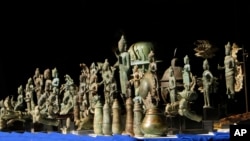Millennium-old Cambodian artifacts displayed in a Japanese collector’s home for two decades have been returned to the Southeast Asian country’s National Museum.
The 85 artifacts are mostly small bronze items and include statues of Buddha and the Hindu god Shiva, plus jars, ceramics and jewelry. Cambodia’s Culture Ministry says some items were older than the Angkor era, which began about 800 A.D. Others date from the Angkor era or just after it ended in the late 14th century.
Cambodia has made intense efforts to recover artifacts looted during its civil war in the 1970s.
At an official reception for the artifacts Friday, Prak Sonnara, secretary of state for the Culture and Fine Art Ministry, praised the Japanese collector for voluntarily returning the artifacts. He said her actions set a good sample for other countries and collectors to follow.
The collector, Fumiko Takakuwa, told reporters after the handover ceremony that she and her husband had bought the items in Japan and liked to collect and display them in their home. But she knew they were originally from Cambodia and that is why she returned them.
“My husband has said before he passed away that those artifacts have to be returned back to Cambodia, and today I am happy that I did,” Takakuwa said.
Prak Sonnara said the 85 items were believed to have been stolen from Cambodia’s temples during the war, when intense looting occurred and valuables were smuggled through neighboring Thailand.
A 1993 Cambodian law prohibited the removal of cultural artifacts without government permission. The law strongly compels owners of items taken abroad after that date to return them. But there is also general agreement in the art world that pieces were acquired illegitimately if they were exported without clear and valid documentation after 1970, the year of a United Nations cultural agreement targeting trafficking in antiquities.
In 2014, three 1,000-year-old statues depicting Hindu mythology were welcomed home to Cambodia after being looted from a temple and put in Western art collections.
Also in 2013, two 10th century Cambodian stone statues displayed for nearly two decades at New York’s Metropolitan Museum of Art were returned to their homeland in a high-profile case of allegedly looted artifacts.




